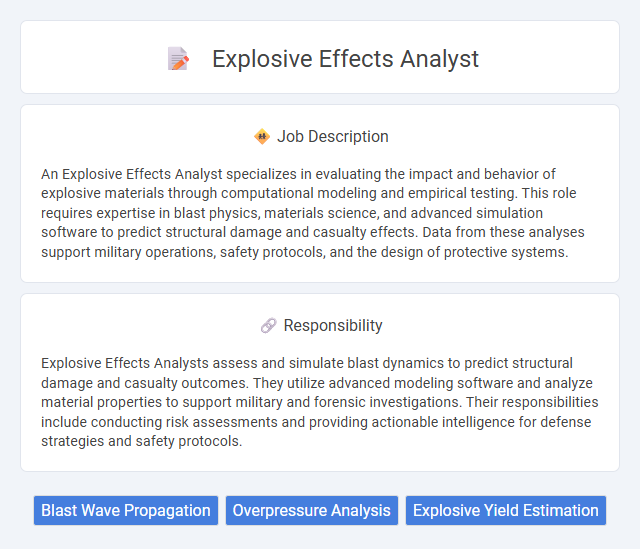
An Explosive Effects Analyst specializes in evaluating the impact and behavior of explosive materials through computational modeling and empirical testing. This role requires expertise in blast physics, materials science, and advanced simulation software to predict structural damage and casualty effects. Data from these analyses support military operations, safety protocols, and the design of protective systems.
Individuals with strong analytical skills and a keen interest in chemistry or physics may be suitable for an Explosive Effects Analyst role, given the specialized nature of the work involving blast dynamics and material behavior. Candidates who are detail-oriented, able to work well under pressure, and possess a high level of safety awareness could have a higher probability of success in this field. Those with limited technical knowledge or discomfort with hazardous materials might find the role less suitable.
Qualification
An Explosive Effects Analyst requires a strong background in physics, engineering, or a related field with specialized knowledge in blast dynamics and explosive materials. Proficiency in computational modeling software such as LS-DYNA or AUTODYN is essential for accurately simulating explosive effects. Experience with data analysis, risk assessment, and familiarity with military or industrial safety standards enhances effectiveness in this role.
Responsibility
Explosive Effects Analysts assess and simulate blast dynamics to predict structural damage and casualty outcomes. They utilize advanced modeling software and analyze material properties to support military and forensic investigations. Their responsibilities include conducting risk assessments and providing actionable intelligence for defense strategies and safety protocols.
Benefit
Explosive Effects Analysts likely enhance safety protocols by accurately predicting blast impacts, which can reduce injury risks and property damage. Their expertise probably supports military and industrial operations in optimizing explosive use for controlled results, increasing operational efficiency. This specialization may also open opportunities for career advancement in defense, engineering, and safety consulting fields.
Challenge
The role of an Explosive Effects Analyst likely involves complex problem-solving challenges stemming from the need to accurately predict blast impacts under varying conditions. Handling diverse data sources and simulating dynamic explosive scenarios may require advanced analytical skills and adaptability to evolving technologies. Success in this position probably depends on balancing precision with innovative approaches to mitigate risks and enhance safety outcomes.
Career Advancement
An Explosive Effects Analyst plays a crucial role in assessing and predicting the impact of explosive materials in military and industrial contexts. Career advancement opportunities often lead to senior analyst positions, project management roles, or specialization in advanced simulation technologies. Professionals in this field can also transition into defense consulting, research and development, or policy advisory roles, leveraging their expertise to influence safety standards and strategic planning.
Key Terms
Blast Wave Propagation
Explosive Effects Analysts specialize in modeling and analyzing blast wave propagation to predict the impact of explosive detonations on structures and environments. They utilize computational fluid dynamics (CFD) and finite element analysis (FEA) tools to simulate pressure distribution, shockwave velocity, and impulse effects over various distances. Accurate blast wave propagation analysis supports critical decision-making in defense, safety engineering, and hazard mitigation projects.
Overpressure Analysis
An Explosive Effects Analyst specializes in evaluating blast-induced overpressure to assess structural and human safety risks. Using advanced simulation software and empirical data, they calculate overpressure magnitudes and impulse durations to inform protective design measures and hazard mitigation strategies. Their expertise is critical in military, aerospace, and civil engineering projects where precise overpressure analysis ensures compliance with safety standards and operational effectiveness.
Explosive Yield Estimation
Explosive Effects Analysts specialize in accurately estimating explosive yields by analyzing blast patterns, shockwave propagation, and resultant damage metrics. Utilizing advanced simulation software and empirical data, they provide critical assessments essential for military operations, demolition planning, and forensic investigations. Their expertise ensures precise measurement of explosive energy release, aiding in both safety protocols and strategic decision-making.
 kuljobs.com
kuljobs.com